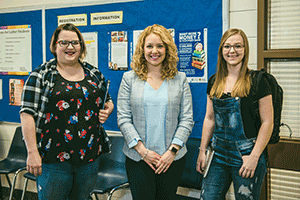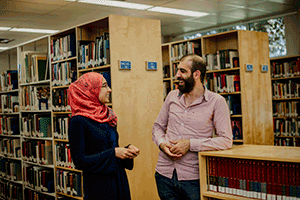Ready to learn more?
Get all the details straight to your inbox!

Luther College is recognized for its high standards of teaching, focused research, and one-on-one academic advising. We value and protect this heritage of excellence in scholarship, freedom of inquiry, and faithful seeking after truth.

To enrol as a Luther College student, simply fill out the University of Regina application form and select Luther as your campus of choice.

The priority deadline for academic application is March 15. To book a personalized enrolment counselling appointment, contact our Recruitment Office at 1-306-206-2117.

The Luther Library has over 24,000 items in its collection, 5,000 books checked out per year, and 7,000 students who come through its door per month.

Smaller class sizes at Luther College means more individualized attention and better connections with your professors, classmates, and academic advisors.

Eating better means studying better. The Luther Cafeteria offers fresh, healthy, nutritious meals seven days a week with a self-serve “all-you-care-to-eat” concept students prefer.

Our student residence, The Student Village at Luther College, welcomes residents from ALL post-secondary institutions in Regina. Rooms come with a meal plan, free laundry, free wi-fi, and a great sense of community.

Luther College is a great choice for high school to university transition. Enjoy all the benefits of a larger campus, without feeling lost in the crowd. Our community is full of caring mentors and peers to ensure a positive student experience.
Get all the details straight to your inbox!
Check out this 2-page infographic on exciting facts and statistics about the Nonprofit/Voluntary sector in Saskatchewan and Canada!
1. Based on data analysed from 2010, Saskatchewan has the highest volunteer rate in Canada when compared to other provinces/territories; this provincial rate is 58% compared to the national average of 47% (http://www.statcan.gc.ca/daily-quotidien/120321/t120321a1-eng.htm).
2. Also based on 2010 data, Saskatchewan boasts the second highest average donation rate. Citizens of this province donated, on average, $544 to voluntary organizations (http://www.statcan.gc.ca/daily-quotidien/120321/dq120321a-eng.htm).
3. Based on a pan-Canada study released in 2004, Saskatchewan had the second highest number of voluntary organizations per capita; the territories had the highest rate (http://sectorsource.ca/sites/default/files/nsnvo_report_english.pdf).
4. There are at least 7,800 registered nonprofits and registered charities in the province (http://sectorsource.ca/sites/default/files/nsnvo_report_english.pdf).
5. The three largest types of voluntary organizations in Saskatchewan are those in the areas of religion, sports/recreation and arts/culture (http://sectorsource.ca/sites/default/files/nsnvo_report_english.pdf).
6. There are fourteen different types of voluntary organizations in the province: arts/culture, sports/recreation, education and research, universities and colleges, health, hospitals, social services, environment, development and housing, law/advocacy/politics, grant-making and fundraising, international, religion, and business and professional associations/unions.
7. The voluntary sector is distinct from the government, private and co-operatives sectors and has its own legislation. Voluntary organizations are independent from governments, do not distribute profits, are self-governing (e.g. they have their own internal democratic processes), and have a significant degree of voluntary participation.
8. One of the earliest, largest and most active voluntary organizations in Saskatchewan was the Saskatchewan Anti-Tuberculosis League which began its work in 1911 (http://spheru.ca/publications/files/Historical%20voluntary%20sector%20work%20on%20health.pdf) .
9. Saskatchewan is in the process of developing its own community-based network of voluntary organizations which will generate new energy and excitement within the sector.
10. There are some academic courses on the voluntary sector offered at the two Saskatchewan universities and some colleges in the province, but there is no co-ordinated, holistic approach to academic programming to serve diverse student interests. The Nonprofit & Voluntary Sector Studies Network is intended to provide this.